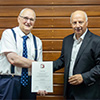Thanks to a Memorandum of Understanding formally signed on Tuesday 30 July 2024 between the University of Malta (UM) and the Malta Office of the United Nations High Commissioner for Refugees (UNHCR Malta), the UM’s Legal Clinic (UMLC) will now be in a better position to offer free legal assistance to displaced and stateless persons.
According to the UNHCR website, from 1 January to 31 December 2023, there were 380 sea arrivals to Malta, including three medical evaluations. An increasing majority of arrivals in 2023 were adult males. Most of these people arriving by sea have asylum and refugee affairs to tend to upon arrival and throughout their journey here, something which UNHCR is increasingly building the capacity for through this and other initiatives.
The legal assistance will be given for first-instance asylum applications, second-instance asylum appeals, Dublin procedures, family reunification, citizenship or naturalisation applications, integration-related legal issues and statelessness-related legal issues.
Support from UNHCR Malta will be provided to UMLC staff and law students in terms of cultural mediation services while working with forcibly displaced and stateless persons in Malta, meeting facilitation once a case is referred for legal assistance, and in the creation of collaborative events and social activities promoting a favourable protection environment in Malta.
A strong basis of data protection will be present throughout this assistance since tackling such cases will necessitate the monitoring of personal details.
In a world where 120 million people are forcibly displaced worldwide as a result of persecution, conflict, violence, and human rights violations, and with 4.4 million stateless persons, access to legal support is indispensable. The complexities of asylum procedures and the need for professional legal guidance cannot be overstated. This initiative is a beacon of hope and a powerful testament to the values of compassion, justice, and human dignity. By offering their expertise, the faculty and students are not only addressing a critical need but also embodying the spirit of global solidarity and humanitarianism. Their efforts will have a profound impact on the lives of those affected”, said Samar Mazloum from UNHCR Malta.
By ensuring that the effective and qualified legal representation is available to these individuals in need, both entities will be indirectly working towards the promotion of the quality of the Maltese international protection framework.
Prof. David E. Zammit, the Head of Department of Civil Law within the University’s Faculty of Laws, and who is the main liaison for this initiative, said “as displaced and stateless individuals navigate the complex and often daunting legal landscape, our law students will provide essential support but they will also, through this experience, gain invaluable hands-on experience, fostering a new generation of socially conscious legal professionals.”
University of Malta Rector, Prof. Alfred J. Vella, remarked that the University believes that access to legal representation is a cornerstone of a fair and just society. “By extending our resources and expertise to these individuals, we are not only upholding the highest values of our institution but also making a tangible difference in the lives of individuals seeking safety and a better future.”
“I commend our Faculty of Laws for their unwavering dedication to this cause and encourage all members of our university community to support and engage with this vital initiative,” he continued.



